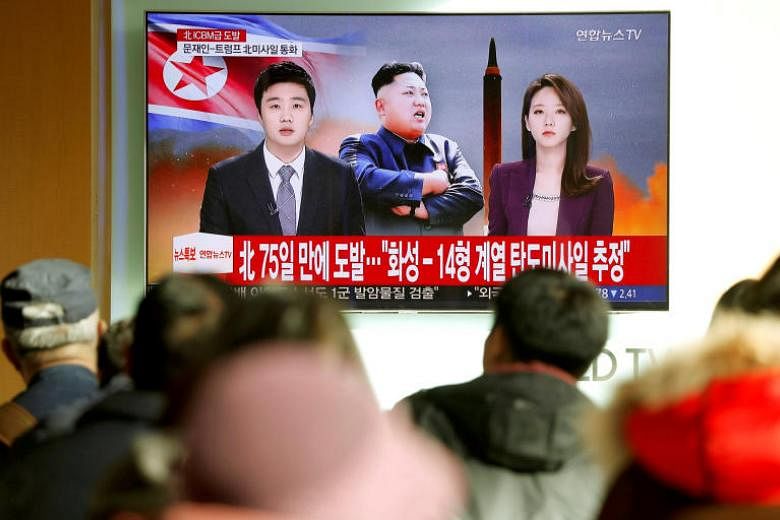BEIJING - There is a window of opportunity for diplomacy on the North Korean nuclear issue now following Pyongyang's successful testing of intercontinental ballistic missiles (ICBM) last year, an analyst has said.
Research associate Zhao Tong of the Carnegie-Tsinghua Centre for Global Policy based in Beijing said it is possible that "North Korea might consider an ICBM flight test moratorium" after its ICBM test successes, particularly the November test of the Hwasong-15 missile. US experts had said after the test that the entire continental US, including Washington DC and New York, could theoretically be within range of a North Korean missile.
At a talk on Wednesday (Feb 7), Mr Zhao said an ICBM test moratorium will give a small window of opportunity for talks between North Korea and the US to de-escalate tensions in the Korean peninsula.
But he also admitted that there are challenges given that the US is not in a hurry to talk with the North Koreans. Instead, Washington wants to use its maximum pressure strategy to force Pyongyang to give up its nuclear weapons, he noted.
Moreover, it would be difficult to make North Korea give up its nuclear weapons completely unless the big powers reduce theirs, he added.
Mr Zhao explained why the North Koreans might consider freezing ICBM flight tests.
He said the North Koreans likely believe they have the credible nuclear deterrence they want - although its nuclear weapon system may not be very reliable, so long as there is a small chance it can hit the US mainland, the Americans would have to treat it seriously.
Another factor is that with each test North Korea conducts, the economic sanctions and embargoes against it gets more severe and these would impact its stability. Also its goal is to get the international community to "accept the reality of its existing nuclear weapons" and if it keeps testing more advanced technologies, this is less likely to happen.
Mr Zhao noted signs of "the beginning of a relatively serious engagement effort from North Korea". These are the rapprochement between Pyongyang and Seoul, and the scaling down of North Korea's winter military exercises.
"If the international community does the right thing, we may be able to persuade North Korea to at least seriously restrict the further development of more advanced ICBMs," he said.
However, he added: "Whether this will ultimately bear fruit very much depends on how the US will respond."
He was not optimistic about the US response. "All signs indicate that the US will continue the so-called maximum strategy," he said.
The bottom line of this strategy, he said, is that the North has to make major concessions on its nuclear programme in the near term.
"The US ...has no appetite for considering a longer denuclearisation strategy that is promoted by China," he said.
China has proposed a two-step strategy: have the North Korea freeze its nuclear and missile programme, and the US and South Korea suspend their large-scale military exercises and then have the two sides sit down to negotiate a denuclearisation process.
Mr Zhao said he saw three problems with the US' maximum pressure strategy.
One was that it undercut the US' reassurance to Pyongyang that it does not intend to change the regime by force. This is because the strategy entails heavy sanctions that threaten the stability of the regime. "It only reinforces the North Koreans' long-standing suspicion that the US has always been after regime change," he said, adding it would only make them hold on tighter to their nuclear weapons.
Another is that the US' logic that if the regime is pushed into a corner it will have no option but to make major concessions to prevent collapse does not hold. Instead, the belief among the Chinese is that Pyongyang would ramp up its military provocations, said Mr Zhao.
A third problem is the sustainability of the strategy. As reports pour in of a humanitarian crisis in North Korea as a result of sanctions and North Korea continues its charm offensive, the international community will face moral pressure to reduce sanctions, he said.
He suggested that both sides should start with easy steps to prevent the situation from escalating and then take step-by-step measures toward denuclearisation.


